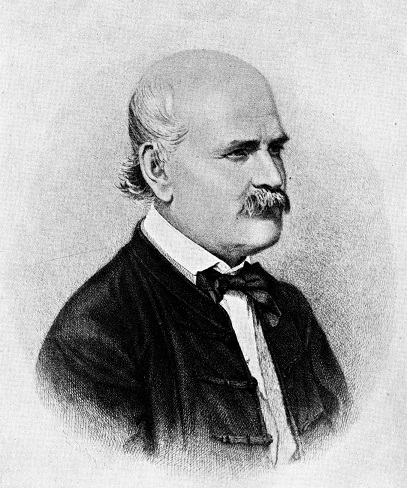Semmelweis
Ignác Fülöp Semmelweis (1 july1818 – 13 august 1865)
Ignaz Philipp Semmelweis, a Hungarian physician, made a groundbreaking discovery in 1847 that significantly reduced the prevalence of puerperal fever, commonly known as "childbed fever." Semmelweis' findings demonstrated the importance of adhering to hand hygiene standards in obstetrical clinics.
During his tenure as an assistant to the professor of the maternity clinic at Vienna General Hospital in Austria, Semmelweis implemented a hand-washing protocol using chlorinated lime solutions for interns who had conducted autopsies. This intervention led to a remarkable decline in the incidence of fatal puerperal fever from approximately 10% (with a range of 5-30%) to a mere 1-2%. At the time, the medical community attributed diseases to various unrelated factors, with each case viewed as distinct, similar to the uniqueness of individual humans.
Semmelweis' theory posited that cleanliness was the sole factor in preventing puerperal fever was radical and faced widespread rejection or ridicule. Consequently, he was dismissed from the hospital and faced harassment from the medical community in Vienna, ultimately leading him to relocate to Budapest.
Frustrated by the medical profession's indifference, Semmelweis penned open letters to renowned European obstetricians, sometimes accusing them of being negligent killers. His peers, including his spouse, suspected that he was experiencing mental instability. In 1865, Semmelweis was admitted to a mental institution, where he passed away just 14 days later, potentially due to severe physical abuse by the facility's staff.
Semmelweis' work only gained widespread recognition after his death, following Louis Pasteur's development of the germ theory of disease, which provided a theoretical foundation for Semmelweis' findings. Today, Semmelweis is regarded as a pioneer in the field of antiseptic procedures.
THE SEMMELWEIS REFLEX
The Semmelweis reflex or “Semmelweis effect” is a metaphor for the reflex-like tendency to reject new evidence or new knowledge because it contradicts established norms, beliefs or paradigms.
